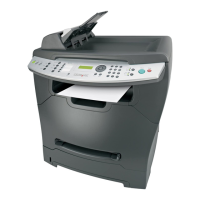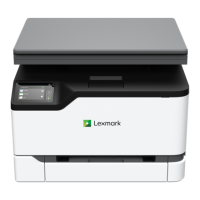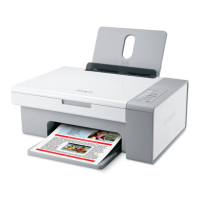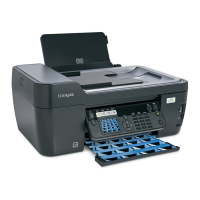Do you have a question about the Lexmark 7014-637 and is the answer not in the manual?
Describes the diagnostic approach to identify and repair FRUs using error codes and symptom tables.
Details memory, print quality settings, flash memory, and font card options for different models.
Specifies operating conditions, temperature, humidity, altitude, and physical dimensions of the printer.
Outlines data stream emulations, standard and optional network/local connections supported.
Details available input/output trays, sheet capacity, and toner/photoconductor yields.
Lists supported paper sizes, types, weights, and input capacities for various media sources.
Discusses paper characteristics like weight, curl, smoothness, moisture content, and grain direction.
Lists paper types not recommended for use due to potential contamination or damage.
Provides guidance on choosing paper to prevent jams and ensure quality.
Gives recommendations for proper paper storage to avoid jams and ensure print quality.
Discusses Lexmark's support for recycled paper and guidelines for its use.
Covers ADF scan speed, document handling, resolution, and flatbed specifications.
Details phone network connectivity, fax resolutions, and miscellaneous fax settings.
Lists required tools and equipment for removal and adjustment procedures.
Provides a list of common acronyms used in the manual with their definitions.
Introduces the diagnostics chapter and safety precautions before starting checks.
Provides tables to help diagnose printer issues based on observed symptoms.
Explains the layout and function of the printer's operator panel buttons and menu structure.
Describes the printer's main display screen and its interactive elements.
Details the functions of various buttons and icons used on the touch-screen interface.
Lists and explains user status and attendance messages, providing guidance on clearing them.
Lists and explains service error codes, their descriptions, and recommended actions for resolution.
Explains how to access the Configuration and Diagnostics menus for testing.
Lists and describes available menus, settings, and operations for printer configuration.
Explains how to enable or disable PPDS emulation for datastream recognition.
Describes how to disable a downloadable emulator (DLE) and its automatic re-enabling.
Details how to restore printer settings to factory defaults, including network and LES applications.
Explains how to control Power Saver menu values and the availability of the feature.
Describes how to adjust the minimum copy memory setting, dependent on installed DRAM.
Explains how to enable or disable job configuration using hard buttons on the panel.
Describes how to format non-volatile storage used for fax data.
Allows selection of storage location for faxes between Disk and NAND.
Sets the size of the no-print area around ADF scanned jobs.
Sets the size of the no-print area around flatbed scanned jobs.
Guides on manually registering flatbed and ADF units after replacement for proper alignment.
Explains how to disable the MFP scanner if it is malfunctioning.
Controls which tray the user is directed to for paper loading prompts.
Controls tray selection for envelope loading prompts when a size is out.
Determines which input source receives paper/envelope change prompts.
Allows deletion of buffered jobs saved on the printer's disk.
Enables or disables hard disk encryption, which formats the disk upon change.
Provides a tool for securely erasing disk contents, making data unrecoverable.
Adjusts text point size for applying high-frequency screens to print output.
Determines whether the printer's Standby Mode is enabled or disabled.
Disables installed Lexmark Embedded Solution applications.
Sets the delay before a repeatedly pressed key starts repeating.
Configures the number of times per second a repeating key will repeat.
Controls the display of wiper messages, with options for On or Off.
Erases user-defined custom message strings.
Sets the USB port throughput to Auto or Full speed.
Improves MFP compatibility with host PCs by adjusting USB Plug and Play settings.
Exits the Configuration menu, triggering a printer POR and restart.
Provides access to various printer tests for diagnostics and repair verification.
Step-by-step instructions to enter the printer's diagnostic mode.
Lists the diagnostic tests available within the Diagnostics menu, with cross-references.
Allows adjustment of print registration settings to ensure proper image alignment on the page.
Describes the Quick Test page content and how to print it for margin and skew adjustments.
Tests the printer's ability to output from various input sources and checks print quality.
Prints test pages to evaluate print quality, including details on toner cartridge lockout disabled.
Lists hardware tests for panel, buttons, DRAM, and USB HS mode.
Tests USB ports for high-speed communication and certification.
Provides tests for duplex functionality, including Quick Test, sensor, and motor tests.
Adjusts the top margin offset for duplex pages to align front and back sides.
Tests duplex input and exit sensors and switches for proper operation.
Tests the duplex paper feed drive system, verifying power and velocity values.
Feeds a blank sheet to duplex paper stop position 1 for testing.
Feeds a blank sheet to duplex paper stop position 2 for testing.
Verifies paper path and sensor functionality for all installed input sources.
Verifies media feeding to the standard output bin using feed and sensor tests.
Tests internal printer sensors (input, exit, door) for proper operation.
Includes tests for disk read/write operations and disk cleaning.
Allows configuration of printer settings like defaults, page counts, and serial number.
Manages electrophotographic setup settings, including defaults, fuser temperature, and warm-up time.
Enables printing of menu settings and event logs for diagnostic information.
Provides a history of printer errors, detailing the 12 most recent issues.
Prints detailed diagnostic information including code versions and page counts.
Removes current information from the Event Log, affecting both viewed and printed logs.
Tests scanner components like ASIC, feed mechanism, and sensors.
Exits the Diagnostics menu and restarts the printer in normal mode.
Guides on electronically aligning the printhead for optimal print quality.
Details the mechanical positioning and alignment of the printhead after removal.
Provides access to printer settings and information, often used with second-level support.
Provides critical safety instructions for handling parts sensitive to electrostatic discharge.
Outlines general procedures and precautions for removing printer parts safely and correctly.
Step-by-step guide for removing the ACM pick tire rollers, including warnings.
Instructions for removing the card reader assembly, including related components.
Details the removal of the covers surrounding the card reader assembly.
Steps to disconnect and remove the card reader cable from the controller board.
Comprehensive instructions for removing the main controller board, including safety precautions.
Steps to remove the shield protecting the controller board for access.
Instructions for removing the cage that houses the controller board.
Details the removal of the fan connected to the controller board.
Step-by-step guide for removing the printer's engine board, including safety warnings.
Instructions for removing the sensor that detects if the printer cover is open.
Steps to remove the door mounting components from the printer's frame.
Detailed procedure for removing the duplex printing unit.
Instructions for removing the gear drive interface between the duplex and main motor.
Steps to remove the cooling fan from the printer.
Procedure for removing the front access door assembly.
Step-by-step instructions for removing the fuser assembly, including safety warnings.
Instructions for removing the scanner's front cover.
Steps to remove the left side cover for internal access.
Instructions for removing the access cover on the front door.
Steps to remove the lower front cover of the printer.
Detailed procedure for removing the Low/High Voltage Power Supply unit.
Instructions for removing the main motor gear drive assembly.
Steps for removing the manual feed clutch component.
Instructions for removing the manual feed solenoid.
Steps to remove the automatic compensation mechanism (ACM) feeder assembly.
Procedure for removing the media feed clutch and its associated cable.
Instructions for removing the sensor that detects media in the manual input slot.
Steps for removing the multipurpose feeder (MPF) assembly.
Instructions for removing the feed clutch of the multipurpose feeder.
Steps to remove the printer's nameplate cover.
Procedure for removing the operator panel's keypad assembly.
Steps for removing the operator panel's display unit.
Instructions for removing the display bezel from the operator panel display.
Steps to disconnect and remove the UICC cable from the controller board.
Instructions for removing the bracket that secures the USB cable.
Steps to remove the supports for the operator panel.
Instructions for removing the supports that allow display rotation.
Steps to remove the left rear frame assembly.
Instructions for removing the right rear frame assembly.
Procedure for removing the entire tub assembly, including many sub-components.
Steps to remove the paper input and duplex sensor assembly.
Detailed instructions for removing the printhead, including alignment notes.
Steps to remove the middle rear cover of the printer.
Instructions for removing the rear door and lower rear cover.
Procedure for removing the rear exit guide, sensor, and reversing solenoid.
Steps to remove the right side cover for internal access.
Instructions for removing the toner level sensor.
Steps to remove the top cover assembly of the printer.
Procedure for removing the transfer roll, including notes on springs.
Steps to remove the upper front guide assembly.
Instructions for removing wear strips from specific paper trays.
Steps for removing wear strips from the 550-sheet tray.
Detailed procedure for removing the Automatic Document Feeder (ADF) unit.
Comprehensive instructions for removing the flatbed scanner assembly.
Steps to remove the ADF separator pad.
Instructions for removing the ADF separator roll assembly.
Steps to remove the printer's kickstand.
Instructions for removing the output bin's LED and lens components.
Steps to disconnect and remove the ADF cable.
Instructions for removing the left scanner cover.
Steps to remove the right scanner cover.
General information on installing and removing option boards.
Instructions for lifting the scanner assembly to access internal components.
Procedure for installing an ISP card, including accessing the controller board.
Steps for removing the printer's hard disk drive.
Instructions for installing a hard disk drive onto an ISP card.
Procedure for installing a hard disk drive directly onto the controller board.
Steps for installing a fax card into the controller board cage.
Identifies the location of key printer components through front view diagrams.
Identifies the location of printer ports and controls through rear view diagrams.
Illustrates the path of paper through the printer's internal components.
Shows diagrams of the Lexmark X46x series controller and engine boards with connector labels.
Diagram of the engine board with connector labels.
Table detailing pin assignments and voltage values for controller and engine board connectors.
Provides a guide for identifying unsafe conditions and potential hazards within the printer.
Specifies lubricants and their application for maintaining printer parts.
Instructions for cleaning the printer's scanner glass for optimal scan quality.
Lists available maintenance kits and their part numbers for printer upkeep.
Explains the legend and conventions used in the parts catalog for identifying components.
Exploded view and parts list for the printer's outer covers.
Exploded view and parts list for the printer's imaging components, including ADF and scanner.
Exploded view and parts list for the printer's paper tray assemblies.
Exploded view and parts list for the printer's electronic components, including boards and sensors.
Exploded view and parts list for the printer's internal frame structure and mechanical components.
Parts list for optional components such as font cards, DIMMs, and adapters.
Lists various power cords available for different regions and lengths.
| Print Technology | Laser |
|---|---|
| Print Resolution (Black) | 1200 x 1200 dpi |
| Print Resolution | 1200 x 1200 dpi |
| Duplex Printing | Yes |
| Fax | Yes |
| Copy Resolution | 600 x 600 dpi |
| Fax Resolution | 300 x 300 dpi |
| Category | Multifunction / All-in-One Printers |
| Connectivity | Ethernet, USB |
| Media Types Supported | Card Stock, Envelopes, Labels, Plain Paper |
| Media Sizes Supported | Letter, Legal, Executive, A4, A5, B5 |
| Scanner Type | Flatbed, ADF |












